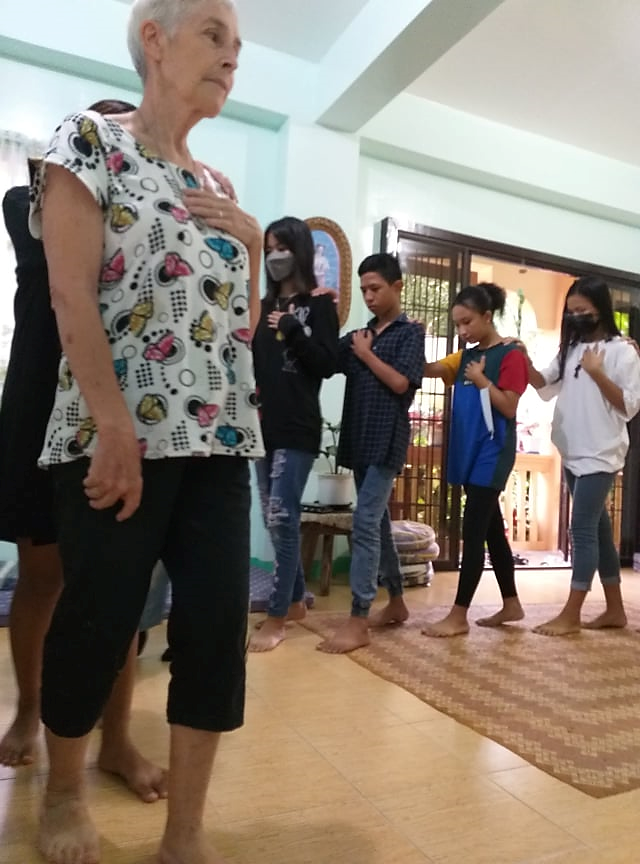An Interview with Sr. Anne-Marie Brittain, NDS about her book Bibliodrama: A Transformative Word.
by Genevieve Balance-Kupang
Words have the power to maim and to lame as well as to heal and transform. -Brittain, 2021
Thank you, dear subscribers, for reading the first part of this series on excavating the Sources: Discovering God as a God of Surprises. In case you missed the previous article, here are the links in both English/German: A No-Word: The Silence of Zen https://www.pressenza.com/2021/10/ a-no-word-the-silence-of-zen/. A No-Word: Die Stille des Zen: https://www.pressenza.com/ de/2021/10/a-Ano-word-die-stille-des-zen/. Here is sharing two comments from our readers regarding A No-Word. Jerome Lee from China expressed: “This is an amazing article, feeling God’s presence and companionship in different ways! I look forward to what tomorrow brings.” Another professor from De La Salle Dasmarinas expressed “Wow! Congratulations, Ma’am! Ang galing po ninyo. I’ve met Sr. Anne-Marie B. It’s a good and beautiful interview.”
I discovered we have some things in common with Sister Anne-Marie, the author of A No-Word: The Silence of Zen and Bibliodrama: A Transformative Word. We both love to walk long distances, meditate (alone or with a group); we continue to be open to surprises and new learning as well as believe that the Sacred Scripture is alive, active, and penetrates to the core of our being as the Letter writers to the Hebrews discovered. She proposed in her books some possibilities of integrating wisdom from Jewish-Christian and Zen traditions with adult-faith development.
The Word of God and the No-Word of Zen remain the root of her spirituality and ministry.
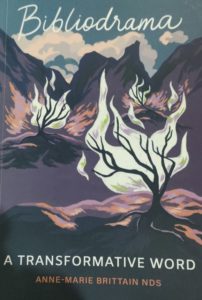
The cover design of the second book by Sr. Anne-Marie Brittain, NDS. Illustrations and cover design: Clarisse Alfonso
Sister Anne-Marie is a UK national. Her mother was from Ireland, while her father was born in London. Although Ireland and England are geographically close, they represent distinct cultures with very different historical narratives. She grew in a family environment of diversity. Her parents were Catholics, and she and her siblings were brought up in an atmosphere of living faith and practice. She was a volunteer missionary (VMM), in 1977, in Eastern Kenya.
She belongs to the congregation of Notre Dame De Sion (NDS), a French foundation dating from the mid-1800s. She came to know the community, as her eldest blood sister, Teresa, is a member and she had stayed with the NDS community over the years. Their open lifestyle, depth of spirituality, small group living and the adaptations they had made to the modern world, she found attractive.
The story of NDS is unusual, for her, it is what gives a particular ‘flavor’ to everything, including its members. The founders Theodore and Alphonse Ratisbonne were Jewish by birth. They valued their biblical heritage, although they had not received much formal Jewish education. The family were bankers, committed to social change for the Jewish people of Strasbourg, many of whom were impoverished and uneducated. Theodore Ratisbonne was a charismatic leader, a preacher and gifted man who gathered around him a small group of women desiring to become religious sisters. They visited and provided for poor families; Theodore served an orphanage in Paris. These first women were particularly concerned with the educational and social needs of young girls who were in the process of becoming Christian (from Jewish families). This was something of a movement in France at that time. So NDS, from these roots, treasures the fact that Jesus was Jewish, as were their founders.
Radical inclusivity is at the heart of their NDS identity. Scripture and its interpretation as nourishment for life was, from the origin, a core value and remains one today.
NDS expanded quickly as Theodore was requested to found schools in different parts of the world. One of his criteria was to accept invitations where Jewish and Muslim populations existed; also places of Catholic minorities, where the sisters could be involved in Ecumenism. From these beginnings’ diversity was always welcomed.
Genevieve Balance Kupang (GBK): Pace e bene, Sr. Anne! Coming from the Mountain Province, I would like to thank you and your community for welcoming me again in your lovely home in Quezon City. Your second book explores Bibliodrama: A Transformative Word. What is Bibliodrama?
Sister Anne Brittain (SAB): As you can see from the word Bibliodrama it has two roots; one is Bible/Scripture/the Word of God and the other is drama which is “action.” Some might think it means “acting”, being on the stage, taking the part of a character in a play, but this is not the meaning. Participants in Bibliodrama workshops are themselves, not another person. They do not act in another part. They bring their life stories to meet with the Word of God and the community. Through the processes and activities new insights can emerge, and transformation can happen. Bibliodrama takes place in a group.

“One heart” or “undivided heart” has been modeled by Jesus who always lived faithfully God’s will in all places and situations. Illustration: Clarisse Alfonso
GBK: Where did it originate? Who were the founders? What are its objectives?
SAB: The foundations of Bibliodrama lie in the belief that the Word of God continues to speak in each generation because it is dynamic. Davar, the Hebrew word for “word” also means “event”, “happening;” there is no other word in the language to distinguish action of the mouth, the body, and events that impinge existentially. The Jewish tradition has a long history of textual interpretation because each letter carries great importance. The questioning mind continually unpacks the stories of what we call the Old Testament (TaNaK for the Jewish people). This is called Midrash, coming from a Hebrew root “search” even “dig;” it has come to mean interpretation or hermeneutics; the imagination, the creative mind is ever active. The Jewish scholar Peter Pitzele has written a book called Scripture Windows, which describes some of the processes and experiences he has encountered: it has been said that: “Bibliodrama transforms the Bible into a mirror through which participants confront the most important aspects of their lives as they immerse themselves in its stories. Scripture Windows not only opens the world on Bibliodrama but also demonstrates its power to teach us who we are and who we can become.” (Rabbi Norman J. Cohen, Provost, Hebrew Union College – Jewish Institute of Religion and Professor of Midrash).
A very influential figure from within Christianity was Walter Wink (1936-2012) a progressive New Testament Scholar, Methodist Minister and Peace Activist. He discovered that pure academic study of scriptural texts often did not lead readers/students to think differently, expand their vision or change. So, he (often accompanied by his artist/dancer wife), developed creative workshops which engaged the body in movement, meditation, artwork, and other creative means. He wrote a ground-breaking book The Bible in Human Transformation, (Philadelphia, Fortress Press, 1973); he was prophetic in his outlook and methods. Groups responded to these creative methods. Since the Word is non-denominational and encompasses different faith traditions, so Bibliodrama can be attractive. It can enable different forms of transformative dialogue to take place. It can help to deepen relationships within communities.
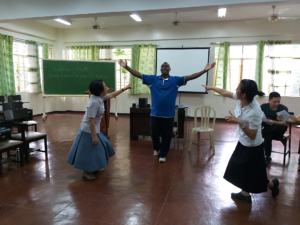
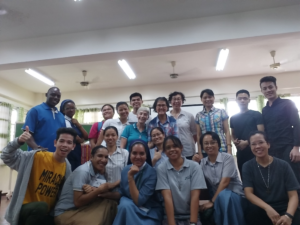
Pictures of Bibliodrama Workshop: Institute of Formation and Religious Studies (Manila). Text: Acts: 3:2 – Man at the Beautiful Gate of the Temple
GBK: Wow, you mentioned personalities which I need to research more about. Who/what influenced you to write about Bibliodrama?
SAB: The Word of God fascinates and attracts me. In recent years, I have been studying Biblical Hebrew and I find it so enriching. My involvement in Bibliodrama ministry makes me realize the surprises that God’s Word continually brings to my life. I really believe in different creative processes such as Prayer Dances, the use of the imagination, spontaneous sharing and above all trust in the dynamism of God’s Word. I wrote a series of 3 booklets with the overall theme of the Word. The first dealt with the Creative Word of Vatican 2 in the Catholic Church; here openings were made with the world and the words of other faith traditions. Since Jesus was Jewish, it is imperative that Christians realize and appreciate something of these Jewish roots. I researched the words and work of 3 pioneer thinkers and theologians and their contributions towards changing biased opinions and consciousness in Christian Theology. One of these was an NDS sister whom I knew and wanted to honor. This 2nd one, A Transformative Word, speaks about Bibliodrama and Lectio Divina. Both can be used as methods to deepen understanding and encounter with the Word and its life-giving dynamism.
GBK: What might be some of the benefits of engaging in workshops in Bibliodrama as faith communities?
SAB: From my experience Bibliodrama is fun, interesting, yielding unexpected fruits. The workshops are facilitated by two people. This format is already expressing the hope-for growth of deeper relationships. Trust is essential and the processes help to deepen and extend this among the community of participants. Interactive activities which often need bodily movements, spontaneous reactions, and a spirit of volunteerism, enable the group to appreciate each other’s gifts more. So, I would see Bibliodrama as a means of enabling the community to explore, challenge, trust and grow together.
GBK: I have appreciated liturgical dances incorporated in our worship. How can Bibliodrama be a means to reach the deepest longing of the human heart to be profoundly connected to the Divine?
SAB: There are many different Prayer Dances, as they are called. They express different moments of the faith journey; some are focused on the sacredness of symbols and the Word itself; others are dances on the pilgrim faith journey. Most are circular, pointing to the never-ending nature of the task; some move the group forward together. This too can be a learning as, at times, the group drags or pushes. These kinds of experiences are moments of insight and realization.
GBK: The use of creativity and imagination can transform and move believers to act in life-giving ways. Can Bibliodrama be one of the means?
SAB: Yes, I believe that it can. Hidden attitudes can be revealed if the participant is honest and aware in the now of the activity. Listening to others when they speak, and move is also very revelatory. Blocks in the consciousness may begin to open, so revealing new possibilities. Of course, Bibliodrama is only one way of using imagination and creativity. But it can propel a person into more awareness if they are willing to trust the processes and the group. Once the mind and heart are more open, then there is greater space for awareness of others and a response to their needs.
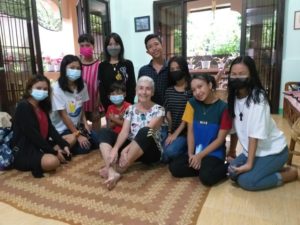
GBK: To whom can we connect to give workshops in the provinces?
SAB: The Bibliodrama Philippine network is organized and there are leaders in different parts of the country. Other groups are active especially in Germany; here, the link between Bibliodrama and Psychodrama is more prominent. There is some work being followed on retreat ministry using Bibliodrama methods and Ignatian spirituality. The pandemic has forced groups to be creative online and to develop other ways of interacting as learning communities. This ministry continues and deepens.
GBK: Thank you, Sister Anne! As a researcher of world religions, I truly appreciate your books where I learned a lot of Hebrew words, and I am blessed for this interchange. I praise God for allowing me to meet you in this journey, along with the other loving NDS sisters. Thank you for your ministry, love, and compassion for the Filipino people. Please continue to pray for us. Iyaiyaman, Sister Anne!
About the writer:
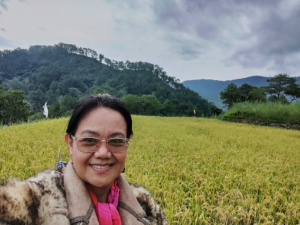 Genevieve Balance-Kupang. An affiliate of the Silsilah Dialogue Movement and a core team member of the Episcopal Commission on Interreligious Dialogue of the CBCP. C-authored a book on World Religions and Belief Systems published by C & E Publishing, Inc., and the series Our Nation, Our World by Sibs Publishing House, Inc. Chair of the Special Interest Groups (SIG) of the World Council for Curriculum and Instruction (WCCI), and a trustee of the Asian Social Institute. A researcher, consultant, anthropologist, and advisor to individuals and organizations engaged in working for good governance, justice, integrity of creation, peace, the indigenous peoples, and societal transformation processes. With a career in the academe and NGOs.
Genevieve Balance-Kupang. An affiliate of the Silsilah Dialogue Movement and a core team member of the Episcopal Commission on Interreligious Dialogue of the CBCP. C-authored a book on World Religions and Belief Systems published by C & E Publishing, Inc., and the series Our Nation, Our World by Sibs Publishing House, Inc. Chair of the Special Interest Groups (SIG) of the World Council for Curriculum and Instruction (WCCI), and a trustee of the Asian Social Institute. A researcher, consultant, anthropologist, and advisor to individuals and organizations engaged in working for good governance, justice, integrity of creation, peace, the indigenous peoples, and societal transformation processes. With a career in the academe and NGOs.


